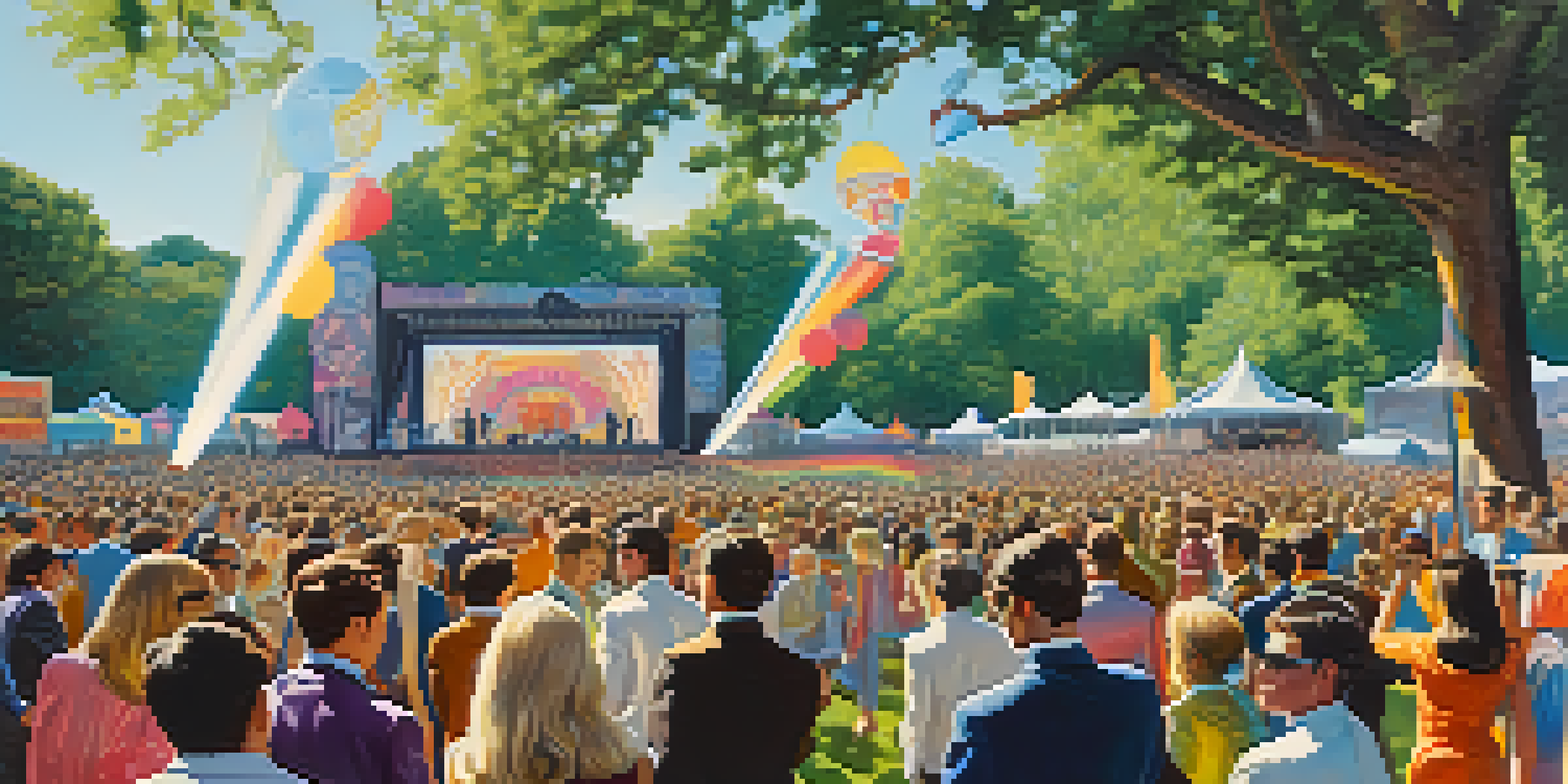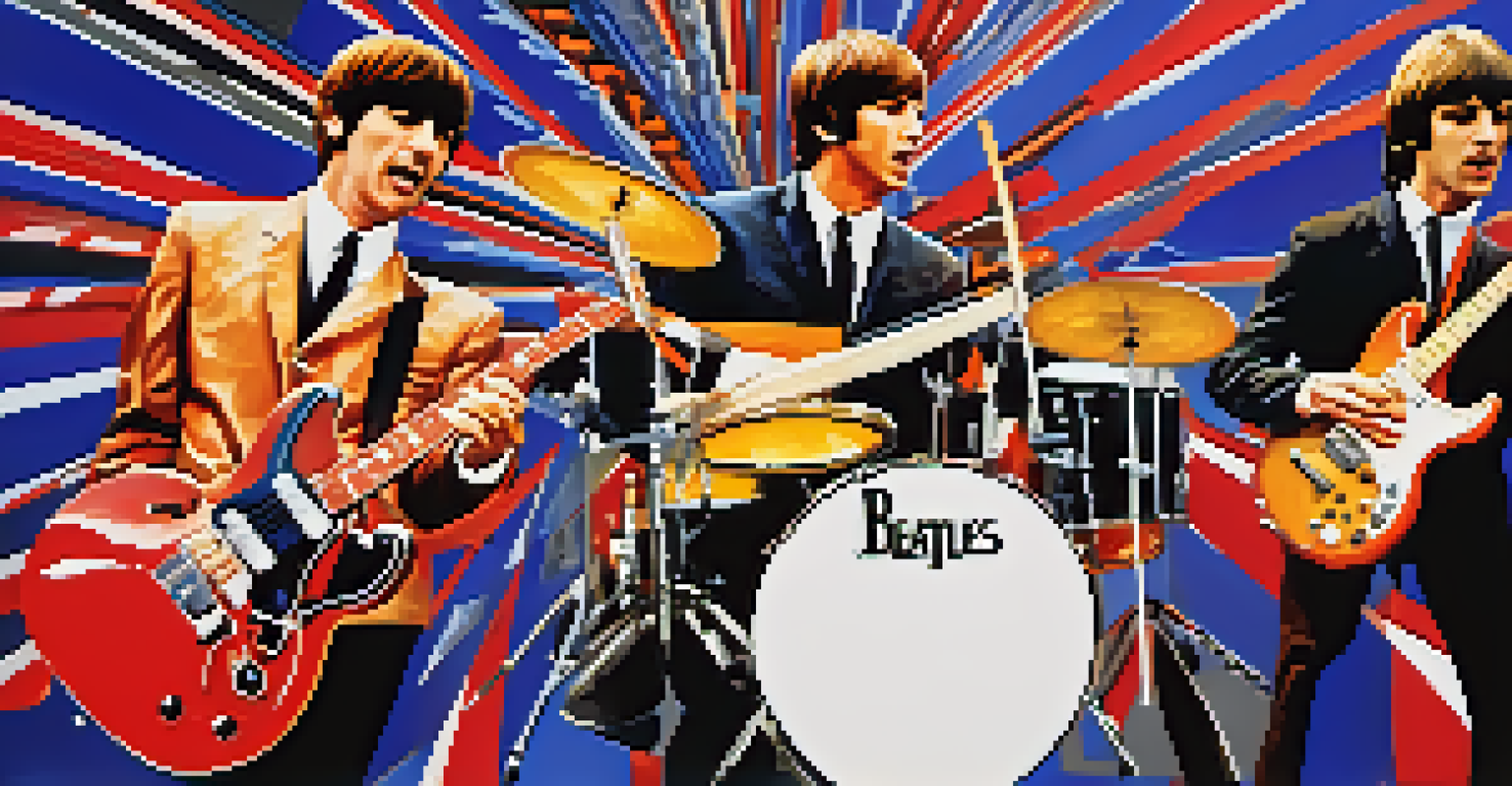The British Invasion: 1960s Music and Cultural Change

Understanding the British Invasion: A Musical Revolution
The British Invasion refers to a wave of British rock and pop bands that stormed the American music charts in the 1960s. This phenomenon was marked by iconic groups like The Beatles, The Rolling Stones, and The Who, who brought a fresh sound and style that captivated American audiences. Their arrival signified not just a musical shift but also a broader cultural change that would influence everything from fashion to social attitudes.
The Beatles are the most famous band in the world, but they were just one part of a larger ensemble that defined a musical revolution.
In 1964, The Beatles made their American debut on The Ed Sullivan Show, and the reception was nothing short of electric. Millions of viewers tuned in, marking the beginning of a new era in music. This moment showcased the power of television in promoting music and artists, and it encouraged other British bands to follow suit, creating a vibrant musical landscape that was rich with diversity and innovation.
As this British wave continued, it encouraged American artists to evolve their sound, leading to a musical dialogue that blended rock, folk, and blues. The cross-pollination of musical styles helped redefine genres and pushed the boundaries of what popular music could achieve, making the British Invasion a pivotal moment in music history.
Key Bands That Defined the British Invasion
The Beatles are often seen as the face of the British Invasion, but they were just one part of a larger ensemble. Bands like The Rolling Stones, with their gritty sound and rebellious image, offered a stark contrast to The Beatles' polished pop. Meanwhile, groups like The Kinks and The Animals brought unique influences that further enriched the musical tapestry of the era.

Each of these bands had their own distinct style, yet they contributed to the collective identity of the British Invasion. For instance, while The Beatles experimented with studio techniques and diverse instrumentation, The Rolling Stones leaned heavily into rhythm and blues. This variety ensured that there was something for everyone, appealing to a wide array of listeners across different tastes.
British Bands Revolutionized Music
The British Invasion introduced iconic bands like The Beatles and The Rolling Stones, reshaping the American music scene and influencing cultural norms.
Together, these bands not only dominated the charts but also played a significant role in shaping youth culture. Their music often reflected the social changes of the time, addressing themes of love, rebellion, and personal freedom, which resonated deeply with a generation seeking to break away from traditional norms.
Cultural Impact: Fashion and Lifestyle Changes
The British Invasion didn't just change music; it also left a lasting mark on fashion and lifestyle. Young people began to adopt the styles of their favorite bands, leading to a surge in mod fashion characterized by tailored suits, colorful patterns, and bold accessories. This newfound sense of style was a form of self-expression that allowed youth to distinguish themselves from previous generations.
Music can change the world because it can change people.
The influence of British bands extended beyond clothing. It shaped attitudes towards art, literature, and even politics, as the youth embraced a more liberal and progressive outlook. The era saw a rise in countercultural movements, with music serving as a catalyst for change and a voice for social issues like civil rights and anti-war sentiments.
As bands like The Beatles and The Stones became cultural icons, their impact on popular culture was undeniable. They inspired a generation to question authority and explore new ideas, paving the way for the counterculture movement of the late 1960s and beyond.
The Role of American Artists in the Invasion
While British bands captured the spotlight, American artists played a crucial role in shaping the British Invasion. Influential figures such as Chuck Berry, Elvis Presley, and Little Richard inspired many British musicians, who admired their talent and charisma. This connection between British and American artists created a rich exchange of musical ideas.
As British bands gained popularity in the U.S., they often credited their American predecessors for their success. The Beatles, for instance, were heavily influenced by American rock and roll, which they infused into their own music. This acknowledgment highlights a mutual admiration and respect that transcended geographical boundaries.
Cultural Shift in Fashion and Attitudes
The styles and ideals of British bands inspired a wave of youth fashion and progressive social attitudes, marking a significant cultural transformation.
The blending of British and American sounds led to the emergence of new genres and styles, enriching the musical landscape of the 1960s. As both sides continued to influence each other, the result was a vibrant tapestry of music that would define an era and leave a lasting legacy.
The British Invasion and the Youth Movement
At the heart of the British Invasion was a powerful youth movement that sought to challenge societal norms. The music of this era became an anthem for young people who were yearning for change and freedom. The rebellious spirit embodied by bands like The Rolling Stones resonated with youth, encouraging them to celebrate individuality and question authority.
As teenagers embraced the British sound, they also began to adopt alternative lifestyles that prioritized creativity and self-expression. This shift was evident in the rise of youth-centric events like music festivals, where young people gathered to celebrate their shared passion for music, art, and social change.
The British Invasion also sparked a sense of community among young people, transcending race and class. It fostered a new sense of identity that was centered around music and culture, uniting individuals from various backgrounds in their pursuit of a more liberated and expressive way of life.
The Influence of British Invasion on Future Music
The legacy of the British Invasion can still be felt in today's music landscape. Many contemporary artists cite the bands of the 1960s as significant influences on their work. Iconic elements such as electric guitar riffs, harmonies, and innovative songwriting techniques can all be traced back to the music that emerged during this transformative period.
Genres like punk rock, alternative, and even pop have roots in the sounds popularized by British bands. Artists like Nirvana and Oasis have drawn inspiration from the raw energy and emotional depth that characterized the music of the British Invasion, ensuring that its impact endures.
Legacy Impacting Future Generations
The British Invasion's influence is evident in contemporary music, as modern artists draw inspiration from the innovative sounds and production techniques of the 1960s.
Moreover, the approach to music production and marketing that was pioneered during the British Invasion has shaped how artists today connect with audiences. The use of music videos, social media, and global tours can all be traced back to the strategies developed by bands in the 1960s, demonstrating the lasting influence of this remarkable era.
Conclusion: A Lasting Legacy of the British Invasion
The British Invasion of the 1960s was more than just a musical phenomenon; it was a cultural revolution that transformed the landscape of popular music and society as a whole. It brought together diverse influences, challenged societal norms, and left an indelible mark on generations to come. The sounds of this era continue to inspire and resonate with artists and fans alike.
As we reflect on the British Invasion, it's essential to recognize the interconnectedness of music and culture. The way these bands shaped fashion, lifestyle, and attitudes highlights the power of art to instigate change and foster community. Their music became a vehicle for expressing the hopes and dreams of a generation.

Ultimately, the British Invasion serves as a reminder of the enduring impact of music on our lives. It encourages us to celebrate creativity, embrace diversity, and recognize the importance of cultural exchange in shaping our world.